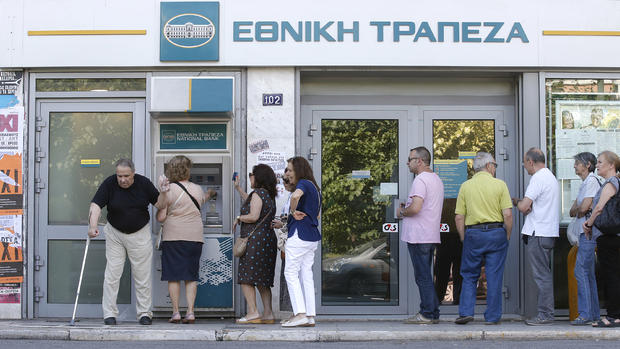Desperate measures as Greece stares down default
Greece's festering debt crisis has put the country on the brink of default on its international loans, and possibly an unprecedented exit from the eurozone.
Here's a rundown of the latest developments, along with a look at their potential impact on Europe and on the global economy.
What is happening?
The Greek government on Sunday announced that the country's banks would stay closed for six business days, while limits were placed on cash withdrawals and on fund transfers overseas. The Athens Stock Market will also remain shut, according to The Associated Press. The closures are an effort to halt the flow of capital out of Greek banks and otherwise contain the kind of banking panic that could cripple Greece's already wounded economy.
The dramatic move followed Prime Minister Alexis Tsipras's decision the previous day to call for a July 5 national referendum on whether to accept a bailout offer from Greece's creditors that is conditioned on the government making deeper cuts to retirement benefits and imposing other "austerity" measures.
The gambit appeared to catch the country's international lenders by surprise. The European Central Bank responded by suspending funding for Greece's banks, a move Tsipras decried in a statement on Sunday as an "attempt to blackmail the will of the Greek people and hinder democratic processes, namely holding the referendum."
Why is this happening now?
Greece is on the hook for a 1.6 billion euro ($1.76 billion) payment to the International Monetary Fund by the end of Tuesday. If it fails to make good on that debt, the government will likely default on its loans. Greek officials asked for more time to make the payment over the weekend, but eurozone financial ministers refused.
Why did Tsipras call for a referendum?
Mujtaba Rahman, an analyst with Eurasia Group, thinks the referendum is an attempt by the Greek prime minister to gain leverage with the country's creditors in negotiating the bailout terms. Tsipras, head of the left-wing Syriza Party, was elected in January largely on his promise to resist the deep government spending cuts and tax hikes Greece's lenders have demanded in return for funding. He is now promising to vote against accepting the creditors' latest offer.
With polls showing most Greeks favor remaining in the 19-member eurozone, staging a referendum also could pay political dividends for Tsipras by allowing him to isolate Syriza hardliners who want Greece to leave the currency bloc.
More broadly, Tsipras appears to be hoping that fears of a meltdown in Greece could rock global financial markets this week. That might put pressure on the country's creditors to make concessions in hopes of avoiding a flare-up of the "contagion" fears that hurt investors during the worst of the European debt crisis in 2010. Asian markets opened lower on Monday as the situation in Greece degraded, and all eyes will be on trade in Europe and the U.S. as a gauge of market concerns.
What happens if Greece defaults on its debt?
In the near term, the country's existing rescue package would end on June 30. If it opts to stay in the eurozone, Greece would have to arrange a new bailout. That would almost certainly prove politically challenging given resistance within the currency union to easing austerity in Greece and opposition within Syriza and other parties to accepting deeper cuts.
How would a Greek default affect the U.S.?
For now, most experts think financial markets would take a default in stride. Since 2010, most countries and large financial institutions have reduced their exposure to Greece sovereign debt, limiting the risk of a domino effect if the cash-strapped country goes bust. As part of the effort to revive Europe's anemic economic growth, the European Central Bank also has pledged to provide support for banks in the region, further curbing the risk of contagion.
What are the dangers over the longer term?
Less certain is how markets would react if Greece were to ultimately leave the eurozone. Many experts think the biggest danger in Europe is no longer the spread of economic crisis, but rather concerns that a default could spur Greece's exit from the eurozone, or "Grexit." No country has ever abandoned the euro since the currency came into effect in 1999, and there are fears that Greece's departure could set a dangerous precedent and undermine confidence on the union.
A Grexit also could encourage anti-austerity parties in Italy, Portugal and Spain -- whose economies remain deeply troubled -- to draw a hard line in negotiating their own countries' debt programs.
"While financial market contagion can be managed with adequate tools, political contagion is another matter," said Michala Marcussen, an economist with Societe Generale, in a note. "This tends to be slow moving, but is also the potentially the more dangerous issue."
What happens next?
Greeks are scheduled to vote next Sunday on whether to accept or reject creditors' latest bailout offer. Although agreeing to those terms could stem the immediate financial crisis, it could cause political chaos by prompting Tsipras -- who stands opposed to the bailout -- to call for new elections. Alternatively, Greece's creditors could seek to resume bailout talks in hope of clinching a deal ahead of the referendum.
In the meantime, analysts say Greece is likely to restrict flows of money leaving the country. Yet while that would keep the country's economy running, such capital controls could also cause damage by, among other things, making it harder for businesses to make and receive payments.
A key question is whether the ECB will continue to provide emergency funding to Greek banks after Tuesday, when Athens is likely to default on its loans. Shutting the taps could cause Greece's banking sector to seize up and increase the chances of a Grexit.
